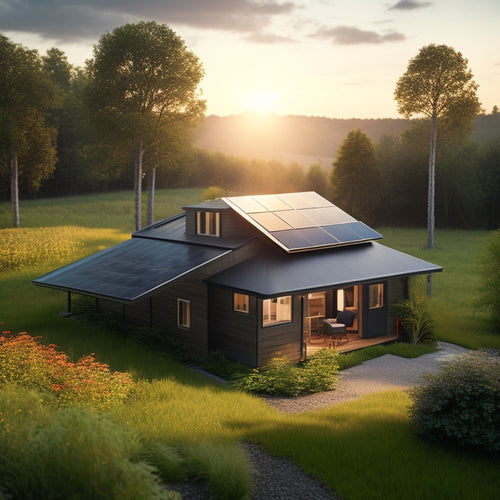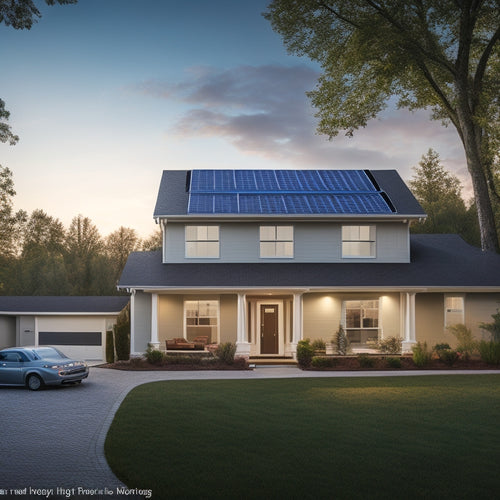
Why Portable Generators Matter for Home Energy
Share
You rely on a steady flow of electricity to power your home, but when the grid fails, a portable generator becomes your lifeline, providing essential energy to keep critical appliances running and your family safe. With reliable power, you can maintain household resilience, prevent data loss, and enjoy peace of mind. By offsetting peak consumption and reducing grid reliance, portable generators can even lower your monthly energy bills. As you investigate the benefits of portable generators for home energy, you'll uncover how they can optimize energy storage, minimize environmental impact, and provide a cost-effective backup solution - and that's just the beginning.
At a Glance
- Portable generators provide reliable power during grid failures, ensuring critical appliances remain operational and families stay safe.
- They offer a cost-effective backup solution, lowering monthly energy bills by offsetting peak consumption and reducing grid reliance.
- Portable generators enable energy storage optimization, integrating with renewable energy sources and enhancing efficiency and independence.
- They allow for uninterrupted power to critical appliances, such as medical equipment and refrigeration, maintaining household resilience and peace of mind.
- By investing in portable generators, homeowners can reduce their environmental impact, minimize expenses, and gain independence from grid failures.
Reliable Power During Outages
You need a reliable source of power when the grid fails, and a portable generator can provide it.
In fact, a home battery backup system Backup Power for Home Appliances can guarantee that critical appliances like refrigerators and medical equipment keep running, preventing food spoilage and maintaining safety.
Power When You Need
During extended power outages, having a reliable source of energy becomes a top priority, especially for households with critical medical equipment, refrigeration needs, or sump pumps. You can't afford to wait for the utility company to restore power, as every minute counts.
That's where portable generators come in – providing you with the power you need, when you need it. With the ability to bring renewable energy anywhere off-grid power, you can rest assured that you'll have a sustainable solution to power your essential appliances and devices.
With a portable generator, you'll have the portable convenience to power essential appliances and devices during an outage. This means you can keep your refrigerator running, your medical equipment functioning, and your sump pump operational.
You'll also have the freedom to move the generator to where it's needed most, ensuring that you're always prepared for an emergency.
Emergency preparedness is key, and a portable generator is an essential tool in your emergency kit. By having a reliable source of power, you'll be able to weather the storm, literally.
You'll be in control, and your family and home will be safe and secure. Don't wait until it's too late – invest in a portable generator today and rest assured that you'll have power when you need it most.
Backup For Critical Appliances
Three significant areas of your home require uninterrupted power supply: medical equipment, refrigeration units, and sump pumps. These essential equipment pieces demand reliable power to maintain appliance safety and prevent costly losses.
During outages, a portable generator provides backup power, ensuring your household resilience and energy independence. Having a reliable power solution in place, such as a Battery Backup System, can provide an immediate and dependable source of power during outages, protecting your sensitive equipment from damage.
Furthermore, it prevents data loss by allowing you to safely shut down your devices or keep them running until the power is restored. Investing in a portable generator is essential for emergency preparedness and disaster readiness.
By having a backup power source, you can maintain operational efficiency and keep your significant appliances running. This is especially important for medical equipment, where a power outage can have severe consequences.
Additionally, refrigeration units require consistent power to keep your food from spoiling, and sump pumps need power to prevent water damage. With a portable generator, you can enjoy peace of mind knowing that your significant appliances will remain functional during outages.
This power management solution allows you to take control of your energy needs, ensuring you're prepared for any situation. By prioritizing portable generator backup, you're investing in your home's resilience and your family's well-being.
Cost-Effective Backup Solution
You'll find that portable generators can greatly lower your monthly bills by offsetting your energy consumption during peak hours.
For instance, when paired with residential solar batteries, they can provide a reliable and efficient backup solution.
By generating your own power, you'll reduce your reliance on the grid, which can lead to substantial cost savings over time.
With a portable generator as a backup solution, you'll be able to optimize your energy usage and minimize your expenses.
Lower Monthly Bills
Lowering your monthly bills is a significant advantage of investing in a portable generator as a cost-effective backup solution for your home energy needs. By providing a reliable source of power during outages, you can reduce your reliance on the grid and avoid peak-demand pricing. This means you'll be paying a lower rate for the energy you use, resulting in substantial savings over time.
As you plan your budget, consider the long-term benefits of energy efficiency. A portable generator can help you optimize your energy consumption, ensuring you're only using what you need. This not only reduces your energy expenditure but also minimizes your environmental impact.
Reduced Grid Reliance
By having a reliable backup power source, such as a portable generator, you're no longer at the mercy of the grid during outages or peak-demand periods. This means you can enjoy grid independence, relying on your own energy security instead of the whims of the grid.
With a portable generator, you can rest assured that your lights will stay on, your fridge will keep running, and your communication devices will remain charged, even when the grid fails.
Moreover, a portable generator provides a cost-effective backup solution, allowing you to reduce your reliance on the grid during peak-demand periods when rates are high.
By generating your own power, you can avoid those hefty peak-hour charges and keep your energy costs in check. This is especially important for households with critical medical equipment or those who rely on refrigeration for medication or food storage.
With a portable generator, you can take control of your energy needs and enjoy the freedom that comes with grid independence.
Parallel Capacitor Bank Design
When designing a parallel capacitor bank, you'll need to evaluate the configuration that best suits your energy storage needs, especially when it comes to guaranteeing continuous power during outages and nights with a reliable backup energy storage solution renewable energy backup solutions.
You'll want to optimize energy storage by selecting the right capacitor values and balancing them to ascertain maximum efficiency.
Capacitor Bank Configuration
Several factors influence the design of a capacitor bank configuration, but none are more vital than the parallel capacitor bank design. You need to take into account capacitor selection, guaranteeing that the chosen capacitors meet your energy efficiency and load balancing requirements.
Proper bank maintenance is also essential, as it affects the overall lifespan of the capacitors and the system's performance metrics.
When designing your capacitor bank configuration, you must integrate the capacitors with your portable generator's voltage regulation system. This guarantees that the output voltage remains stable, even during charging cycles.
Safety protocols must also be in place to prevent overcharging or electrical shocks. A well-designed capacitor bank configuration will provide you with a reliable and efficient energy storage system, giving you the freedom to power your home as you see fit.
Energy Storage Optimization
Three key considerations drive the optimization of energy storage in your portable generator's parallel capacitor bank design: capacitor matching, bank configuration, and charging/discharging protocols.
You'll want to guarantee that your capacitors are matched regarding capacitance, voltage rating, and ESR (equivalent series resistance) to minimize energy losses and maximize energy efficiency. A well-designed bank configuration will also help to reduce energy losses and improve overall system reliability.
When it comes to charging and discharging protocols, you'll want to implement smart algorithms that optimize energy storage and release based on your specific energy needs. This is particularly important when integrating renewable energy sources, such as solar or wind power, into your system.
By optimizing energy storage and release, you can secure a seamless shift between grid power and renewable energy sources, minimizing downtime and maximizing energy efficiency.
Wattage for Appliance Needs
You'll need to determine the power requirements of each appliance you want to run with your portable generator, as they vary widely.
For instance, a refrigerator typically requires around 1,000-2,000 watts, while a laptop might need only 65 watts.
When camping, it's crucial to take into account the energy needs of your outdoor solar power solutions solar power station and portable camping generators to guarantee you have a reliable off-grid energy source.
To guarantee you choose the right generator, you'll need to calculate the total wattage of all the appliances you'll be using simultaneously.
Appliance Power Requirements
Determining your appliance power requirements is an essential step in selecting the right portable generator for your home energy needs.
You'll need to calculate the energy consumption of each appliance you want to power during an outage. Start by identifying the appliances you consider essential, such as refrigerators, medical equipment, and lights.
Then, check the manufacturer's specifications or the appliance's nameplate to determine its wattage rating.
Consider the appliance compatibility of your portable generator, ensuring it can handle the starting wattage and running wattage of your appliances.
For example, a refrigerator may require 800 watts to start and 400 watts to run continuously. You'll need a generator that can provide the necessary power to meet these requirements.
Make a list of your appliances and their corresponding wattage ratings to get a clear illustration of your energy needs.
This will help you choose a portable generator that can effectively power your home during an outage, giving you the freedom and security you need.
Total Wattage Calculation
Most of your essential appliances require a significant amount of power to function during an outage, and calculating their total wattage is key to selecting the right portable generator. To do this, you'll need to determine the wattage measurement for each appliance you want to power.
Check the appliance's nameplate or manual for the wattage rating, usually indicated in watts (W). Add up the wattage ratings of all the appliances you want to power simultaneously to get the total wattage requirement.
Keep in mind that some appliances, like refrigerators and air conditioners, have surge requirements that exceed their running wattage. You'll need to factor in these surges when calculating your total wattage requirement.
Additionally, consider the generator efficiency, which can range from 70% to 90%. To guarantee you have enough power, you may want to oversize your generator by 10-20% to account for any inefficiencies.
Lower Emissions Than Inverters
You're likely aware that inverters, commonly used in solar and wind power systems, can produce high levels of emissions.
In contrast, portable generators emit considerably fewer pollutants, ensuring a cleaner air guarantee for you and your family.
Cleaner Air Guarantee
Your portable generator's exhaust emissions are an important consideration, as they directly impact the air quality in your living space.
When you choose a portable generator, you're not just deciding on a power source - you're making a choice that affects your environmental impact. That's why a cleaner air guarantee is vital.
Portable generators with lower emissions than inverters guarantee you're breathing easier while still meeting your energy needs.
You'll no longer have to compromise between power and air quality. By opting for a cleaner portable generator, you're reducing your carbon footprint and creating a healthier environment for you and your family.
Look for generators with advanced emission control systems, such as catalytic converters, that minimize pollutants like carbon monoxide, hydrocarbons, and particulate matter.
These systems guarantee your generator meets strict environmental standards, giving you peace of mind and a cleaner conscience.
With a portable generator that prioritizes air quality, you can enjoy the freedom to power your life without sacrificing your values.
Frequently Asked Questions
Can I Use a Portable Generator for Sensitive Electronics?
You can safely power sensitive electronics with a portable generator if it has built-in generator surge protection and you check the device's compatibility, ensuring your equipment receives clean, stable energy without risking damage.
How Often Should I Maintain My Portable Generator?
You should maintain your portable generator regularly, ideally every 25-50 hours of use, to guarantee peak performance, extend its lifespan, and prevent costly repairs; follow generator maintenance tips to keep it running smoothly and efficiently.
Are Portable Generators Safe for Indoor Use?
You shouldn't use a portable generator indoors due to generator safety concerns; it can produce deadly carbon monoxide, and indoor hazards like fires and electrical shocks are highly likely, so always operate it outdoors, away from windows and doors.
Can I Connect Multiple Appliances to a Single Outlet?
You'll need to prioritize power distribution and load management when connecting multiple appliances to a single outlet, ensuring you don't overload the generator, as exceeding its capacity can lead to damage or even fire hazards.
Do Portable Generators Come With Built-In Voltage Regulators?
You'll find that most portable generators don't come with built-in voltage regulators, but some inverter-style generators prioritize voltage stability, ensuring your appliances receive a consistent, clean power supply, whereas conventional generators may require external regulators.
Explore More
As you weigh your home energy options, remember that portable generators are a reliable and cost-effective solution for backup power. With advanced designs like parallel capacitor banks, they can efficiently meet your appliance needs. Plus, they produce lower emissions than inverters. Did you know that in 2020, the average American experienced over 8 hours of power outages? With a portable generator, you can take control of your energy future and stay powered up, even when the grid goes down.
Related Posts
-

Renewable Energy Solutions to Reduce Your Carbon Footprint
To reduce your carbon footprint, adopting renewable energy solutions is key. Using solar panels or wind turbines can ...
-

Diy Off Grid Solar
By embracing DIY off-grid solar, you can break free from grid dependence, slashing your energy bills by up to 90% and...
-

Cost of Solar With Battery Backup
You're investing in a solar panel system with battery backup to guarantee reliable power during outages. The cost of ...


